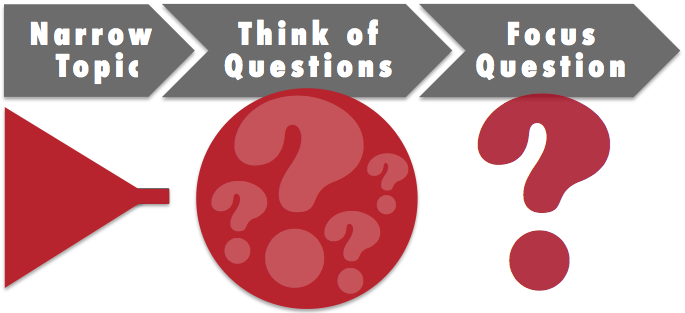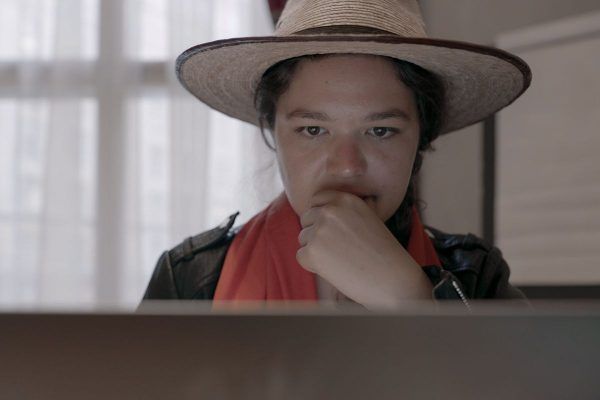A Sense of Doubt blog post #1810 - ENGLISH 102 subjects and narrowing - questions
What subject to explore for a research project and how to narrow it?
Often when students are faced with doing a research project students open Google and type either "research paper topics" or "research paper questions."
A quick note on SUBJECT VS. TOPIC.
Because we use the word TOPIC as part of TOPIC SENTENCE, which is the first sentence of a paragraph in an essay and expresses a part of the main idea of the whole essay, I like to reserve it for that use. So topics are PARTS of a subject.
The word SUBJECT best suits the global main idea of a work in its entirety or what I like to call THE WHOLE ENCHILADA, as opposed, I assume, part of an enchilada.
Anyway, Google "research questions," and here's a top result:
Talk about lame and useless but that's lame and useless.
But scroll down, and you find things like this:
113 Great Research Paper Topics
There's some good choices here, like
How have the goals of feminists changed over the decades?
This one has promise. One might argue that feminists have lost their way. One might argue that neo-feminism is better and more evolved, more like humanism than old-school "feminism." Okay, maybe.
But others are just going to be INFORMATIVE
What were the causes and effects of the Salem Witch Trials?
Sure, one can ARGUE for causes/effects but is it a call to action? Is it going to produce a strong argument? Probably not.
BUT we have some hope because every idea at this site is expressed as a RESEARCH QUESTION. So, that's a good idea.
What we want to find is an inspiring item, which is why browsing may be better as suggested in the PITCH ASSIGNMENT.
Let's look at TED talks. I found these in a quick search:
Dan Gilbert
The surprising science of happiness
Oliver Sacks
What hallucination reveals about our minds
Matthew Winkler
What makes a hero?
All of these have potential.
Let's try looking for documentaries as suggested, also.
Here's a top result:
The 25 Best Documentaries on Netflix Right Now | Collider
I know I risk getting projects on THE TIGER KING (blech), but there's better things here. Veer away from what's POPULAR and potentially nauseating due to that popularity.
Here's a couple nuggets of gold:
American Factory
The Great Hack
13th

As you can imagine there are a lot of ideas popular with students that PROBABLY will not generate good projects. Here's a short list of those
serial killers
dreams
area 51
traumatic brain injuries
the death penalty
gun control
anxiety
The purpose of this post is to help you think of UNIQUE ideas and work to narrow those ideas.
And so, what I shared in class...
This is a very sketchy post. As in, originally, a sketch of some things to share in class. It's a bit more robust now, but parts of it are still sketchy.
I just "threw up" some text last night to get ready to teach a class. I wanted to show some searching within a subject area to get some ideas for directions, arguments, and focusing questions as I begin a research project to give my students some idea of the process and the importance of the initial searching and the building of a robust working bibliography.
I found the visual above, here:
https://www.slideshare.net/AnamikaOf/research-problem-presentation
To start and to brainstorm, my two subjects were mushrooms and surveillance society.
I always recommend investigating the general landscape of a subject via Wikipedia and some quick Google searching. I think TED talks are very valuable, so I often search to see what talks have been given on my subject and if these can provide focus.
The search process works best when we examine what we find and consider (list as notes) possible directions for our research and ultimate composition.

MY FIRST QUESTION - If I start eating more mushrooms, what benefits will I reap?
Mushrooms - wiki - https://en.wikipedia.org/wiki/Mushroom
Sadly, the mushroom page on Wikipedia is not very robust.
Try searching Mushrooms - Google
- are mushrooms intelligent?
Mushrooms topics - Google
This is interesting:
Top ten questions - mushrooms
Mushrooms and - look at frequent search terms
Mushrooms and geology
and alcohol
and depression
and pregnancy
and ptsd
and topics
etc.
Often the searches others have performed will suggest ways to focus the subject.
Mushrooms and Ted Talks - also look at frequent terms
- 6 ways mushrooms can save the world - Paul Stamets
Then I tried some pairings of my own in searches.
Mushrooms and geomorphology
Mushrooms and geology
Mushrooms and age
- can mushrooms change your personality?
I tried searching Mushrooms on Youtube
Youtube is a vast wilderness and many of the videos will be totally useless.
LENSES - Teachers at LCC prefer the term lenses for modes of investigation, the lens through which the writer views the subject. Lenses are much like categories and other areas of study. Often they conform to major areas of study in college but not always, such as historical, psychological, sociological, educational, cultural, medical, political, scientific, economical, business-related, legal, environmental, criminal-justice-related, literary, and others I have not listed.
For mushrooms, history, of course, as almost every subject will need historical analysis. Knowing that mycelium is ancient and survived two ice ages, I searched for mushrooms and geology. Also, knowing that mushrooms eat rocks, I thought I might find useful material. Botany and ecology lenses will be required of this subject. I might also view the subject through its psychological and medical applications as well as how to educate the general public better about the wonderful benefits of fungi.
https://en.wikipedia.org/wiki/Mycelium

Image result for focusing research questions; this might be helpful:
https://ohiostate.pressbooks.pub/choosingsources/chapter/developing-research-question/
 |
| https://www.theguardian.com/technology/2015/jul/23/panopticon-digital-surveillance-jeremy-bentham |
NEXT SEARCH
I performed the same search with surveillance, thinking of surveillance society, the new phenomenon of spying, data collection, and the virtual Panopticon.
| https://www.brown.edu/Departments/Joukowsky_Institute/courses/13things/7121.html |
Surveillance
My initial question - should I live off the grid?
Surveillance issues in smart cities - wiki
- The Wikipedia article
https://en.wikipedia.org/wiki/Surveillance_issues_in_smart_cities
came up as I began the search in Wiki and proved much more viable with topics and focus than the mushroom page. Things like panopticism, police state, privacy, and mass surveillance through big data collection attract my interest.


searching...
Ted talks and surveillance
There's some good ones!
This search also proved useful with good talks on privacy, the impact of being tracked by our phones, "dark secrets" of the surveillance state, and more.
Surveillance and - look at frequent search terms

LENSES - There's huge political issues here that impact privacy. History, of course. Psychology and sociology are both good areas to explore. Law enforcement will be a natural part of this subject.


The goal of performing multiple searches at the beginning of the research process is to find the lenses and find focusing questions that will lead to arguments all of which open the door to additional research and the materials a writer should add to a working bibliography.
I spoke at length about this process in class and off the cuff, so I am sure I am not remembering everything I said. I feel I have captured the basics and the important ideas, though I long for a transcription.

MORE IDEAS
INTROVERSION
Introverts are under valued in our culture. Why is that?
THE BRAIN
How does the brain work and what can we learn from Jill Bolte Taylor? Two cool videos to get you thinking.

Hey, Mom! Talking to My Mother #1136 - Introversion collected and t-shirt reprint - Throwback Thursday for 1812.06
with Susan Cain - THE POWER OF INTROVERTS
and Jill Bolte Taylor on the brain workings (stroke of insight) and development - teenagers
ALSO
Hey, Mom! Talking to My Mother #1058 - Listen to the power of QUIET people
Hey, Mom! Talking to My Mother #323 - More on introverts
and introvert music to go with it all - here -
A Sense of Doubt blog post #1438 - And Hiding Away - The Sky is Dark With Mystery

+++++++++++++++++++++++++++++++++++++++++++++++++++++++++++++++++++++++
+++++++++++++++++++++++++++++++++++++++++++++++++++++++++++++++++++++++
+++++++++++++++++++++++++++++++++++++++++++++++++++++++++++++++++++++++
- Bloggery committed by chris tower - 2002.01 - 10:10
- Days ago = 1673 days ago
- New note - On 1807.06, I ceased daily transmission of my Hey Mom feature after three years of daily conversations. I plan to continue Hey Mom posts at least twice per week but will continue to post the days since ("Days Ago") count on my blog each day. The blog entry numbering in the title has changed to reflect total Sense of Doubt posts since I began the blog on 0705.04, which include Hey Mom posts, Daily Bowie posts, and Sense of Doubt posts. Hey Mom posts will still be numbered sequentially. New Hey Mom posts will use the same format as all the other Hey Mom posts; all other posts will feature this format seen here.
and introvert music to go with it all - here -
A Sense of Doubt blog post #1438 - And Hiding Away - The Sky is Dark With Mystery

+++++++++++++++++++++++++++++++++++++++++++++++++++++++++++++++++++++++
+++++++++++++++++++++++++++++++++++++++++++++++++++++++++++++++++++++++
+++++++++++++++++++++++++++++++++++++++++++++++++++++++++++++++++++++++
- Bloggery committed by chris tower - 2002.01 - 10:10
- Days ago = 1673 days ago
- New note - On 1807.06, I ceased daily transmission of my Hey Mom feature after three years of daily conversations. I plan to continue Hey Mom posts at least twice per week but will continue to post the days since ("Days Ago") count on my blog each day. The blog entry numbering in the title has changed to reflect total Sense of Doubt posts since I began the blog on 0705.04, which include Hey Mom posts, Daily Bowie posts, and Sense of Doubt posts. Hey Mom posts will still be numbered sequentially. New Hey Mom posts will use the same format as all the other Hey Mom posts; all other posts will feature this format seen here.





No comments:
Post a Comment